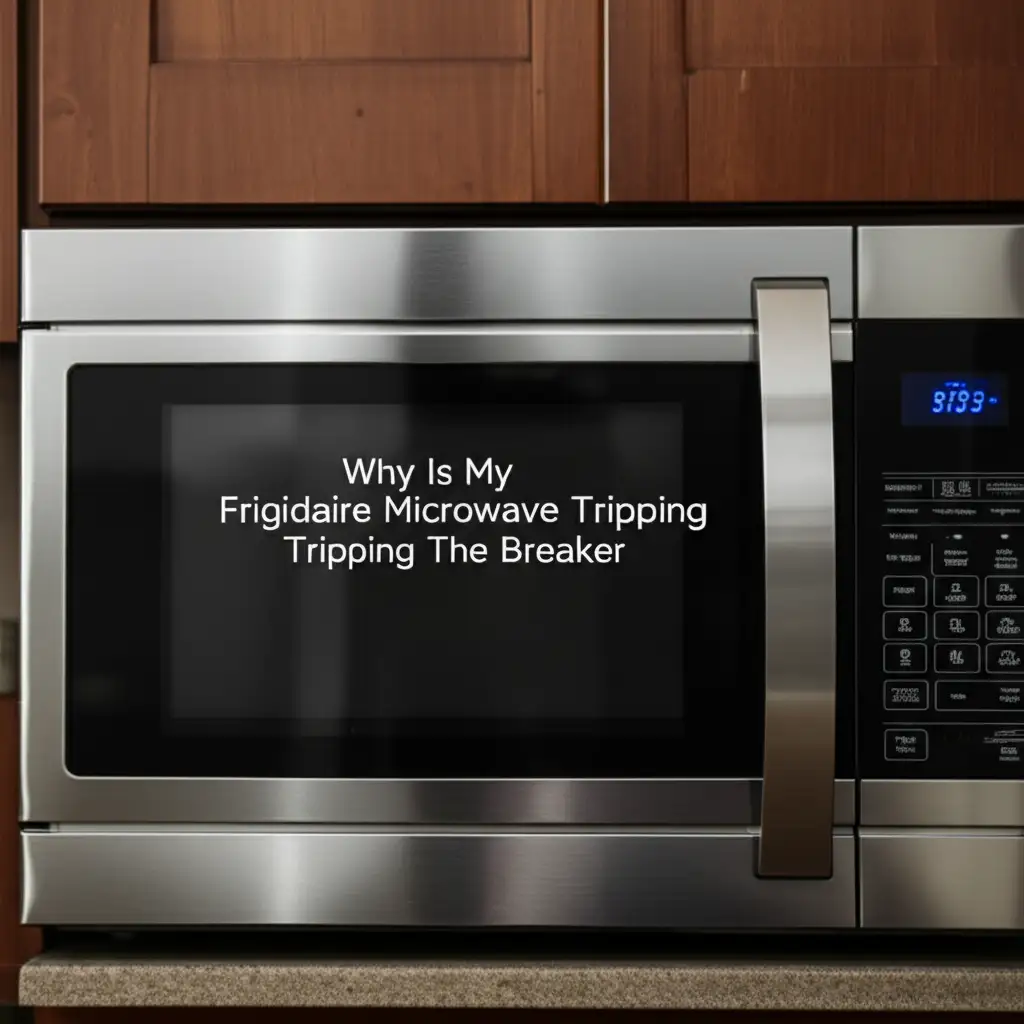· Katria Melrose · Appliance Troubleshooting · 19 min read
Why Is My Frigidaire Microwave Tripping The Breaker

Why Your Frigidaire Microwave Keeps Tripping the Breaker
It is frustrating when your microwave suddenly goes dark. Even worse, it shuts off power to other parts of your kitchen. If your Frigidaire microwave is tripping the breaker repeatedly, you are not alone. This issue signals a problem that needs attention. It is a common household concern that can stem from various sources.
I understand how disruptive this can be for your daily routine. This guide will help you understand why your Frigidaire microwave trips the breaker. We will explore common electrical issues and internal component failures. You will learn practical troubleshooting steps. I will also explain when it is time to call a professional. By the end, you will have a clear path to resolve this problem safely.
Takeaway
- Check the Circuit: Ensure the microwave is on a dedicated circuit and not overloading it with other appliances.
- Inspect the Outlet: Test the microwave in a different outlet to rule out a faulty wall receptacle or home wiring issue.
- Look for Internal Faults: Malfunctioning door switches, magnetrons, capacitors, or transformers are common internal culprits.
- Examine the Power Cord: A damaged power cord or plug can cause short circuits and trip the breaker.
- Prioritize Safety: Always disconnect power before inspecting components and consider professional help for complex electrical repairs.
A Frigidaire microwave trips the breaker usually due to an electrical overload, a short circuit within the appliance, or a faulty internal component like a magnetron or capacitor. Less often, old house wiring or a weak circuit breaker can also be the cause.
Common Electrical Issues Tripping Your Frigidaire Microwave Breaker
Your home’s electrical system and the microwave work together. Sometimes, this connection can cause problems. An overloaded circuit is a frequent reason a Frigidaire microwave trips the breaker. This happens when too many high-power appliances run on the same circuit. The circuit breaker detects this overload and trips to prevent damage or fire.
Another common issue is faulty house wiring. Older homes sometimes have wiring that cannot handle modern appliance demands. A loose connection or a damaged wire in the wall can also lead to short circuits. This type of fault immediately trips the breaker. It is a safety mechanism protecting your home.
Overloaded Circuits and Your Frigidaire Microwave
Microwaves use a lot of electricity. A typical Frigidaire microwave needs a dedicated circuit or shares one with only a few other low-power items. If you have the microwave, toaster, coffee maker, and maybe a blender all running on the same circuit, it can draw too much current. The circuit breaker is designed to handle a specific amount of current, often 15 or 20 amps. When current exceeds this limit, the breaker trips.
To test this, unplug all other appliances from the outlets on the same circuit as the microwave. Then, try to use your Frigidaire microwave again. If it runs without tripping, you have likely found the problem. You need to redistribute your appliances or install a new dedicated circuit. You can also explore why other appliances like your LG dishwasher keep tripping the breaker as these principles often overlap.
Faulty Outlet or Home Wiring
Sometimes the problem is not with the microwave itself. It could be with the electrical outlet or the wiring behind it. An old, worn, or damaged outlet can cause a short circuit. This will trip the breaker every time you plug in a high-draw appliance like a microwave. Similarly, issues with the home’s wiring can also lead to trips.
You can test the outlet by plugging another high-power appliance into it. If that appliance also trips the breaker, the issue is with the outlet or wiring. You can also try plugging your Frigidaire microwave into a different outlet on a different circuit. If the microwave works fine there, you need to call an electrician to inspect your original outlet and wiring. Learning about why your Whirlpool refrigerator keeps tripping the breaker can also provide insights into general home electrical issues.
Internal Component Failures Causing Breaker Trips in Frigidaire Microwaves
Beyond external electrical issues, internal components within your Frigidaire microwave can fail. These failures often create a direct short circuit or draw excessive current. This immediately causes the breaker to trip. Diagnosing these internal issues often requires careful testing and sometimes professional help. Understanding these parts helps pinpoint the problem.
Common culprits include the door switches, magnetron, capacitor, and high-voltage transformer. Each plays a vital role in the microwave’s operation. When one fails, it disrupts the entire system. A failing component can be a significant reason why your Frigidaire microwave trips the breaker.
Malfunctioning Door Switches
Microwaves have safety interlock switches on the door. These switches ensure the microwave only operates when the door is fully closed. If one or more of these door switches fail, it can create a short circuit. This short circuit will cause the breaker to trip as soon as you close the door or press start. Sometimes, the microwave might even turn on when you open the door due to a faulty switch. This scenario can cause concern and is a clear indicator of a problem.
You might hear a clicking sound when you open and close the door. This indicates the switches are working. However, if the clicks are absent or erratic, a switch may be faulty. You can test these switches with a multimeter. Always unplug the microwave before attempting any internal inspection or testing. Issues with door switches are also common reasons for other microwave problems, such as why your Frigidaire microwave turns on when you open the door.
Deteriorating Magnetron
The magnetron is the core component that produces the microwaves. It is what actually heats your food. Over time, the magnetron can wear out or become damaged. When a magnetron fails, it often creates a direct short to ground. This immediately trips the circuit breaker. A faulty magnetron usually results in the microwave not heating food.
If your Frigidaire microwave trips the breaker right when you press start and also fails to heat, the magnetron is a strong suspect. Replacing a magnetron is a complex and potentially dangerous repair. The high voltage components inside a microwave can store a lethal charge even when unplugged. It is best to have a qualified technician handle magnetron replacement. This is similar to how a faulty component in a GE microwave keeps tripping the breaker.
Bad Capacitor or Diode
The high-voltage capacitor and diode work together with the transformer. They convert standard household electricity into the very high voltage needed for the magnetron. If either the capacitor or the diode fails, it can cause a direct short circuit. This immediately trips the breaker. A bad capacitor might bulge or leak. A bad diode often looks burnt or discolored.
Like the magnetron, these components handle extremely high voltage. They can hold a dangerous electrical charge even after the microwave is unplugged. It is critical to discharge the capacitor safely before touching it. This requires specialized tools and knowledge. For safety, this repair should only be attempted by an experienced professional.
Damaged High Voltage Transformer
The high-voltage transformer steps up the voltage from your household supply. It provides the necessary power for the magnetron, capacitor, and diode to function. A damaged or shorted transformer will draw excessive current. This immediately trips the breaker. If the breaker trips as soon as you press the “start” button, the transformer could be the issue.
Sometimes, a faulty transformer might produce a humming or buzzing sound before failing completely. It might also show visible signs of burning or charring. Replacing the high-voltage transformer is another complex and hazardous task. Due to the significant electrical danger, professional repair is strongly recommended.
Examining Your Frigidaire Microwave’s Power Cord and Plug
Before diving into internal components or complex electrical diagnostics, check the simplest parts. The power cord and plug are often overlooked. Yet, they can be primary culprits when a Frigidaire microwave trips the breaker. These parts are constantly handled and can suffer wear and tear. A damaged cord or plug creates a direct pathway for electrical issues.
Inspect them carefully for any visible signs of damage. A compromised power cord can lead to dangerous situations. Always ensure your microwave’s power connection is secure and intact. This simple check can save you a lot of time and effort.
Inspecting for Visible Damage
Look closely at the power cord from where it exits the microwave to the plug. Check for cuts, kinks, fraying, or any signs of insulation damage. A damaged cord can expose bare wires. This creates a direct short circuit. Even small nicks can be problematic under high electrical load. Such damage will almost certainly cause the breaker to trip.
Next, examine the plug itself. Look for bent or broken prongs. Check for discoloration or burn marks around the prongs. These marks indicate overheating or a poor connection in the outlet. A loose plug connection can also cause intermittent short circuits. If you find any damage, replace the power cord or the entire microwave if the cord is not easily replaceable. A damaged cord also leads to other issues, such as why your Frigidaire microwave keeps blowing fuses.
Loose or Corroded Connections
Beyond visible damage, internal issues within the cord or plug can occur. Over time, the internal wires within the cord can become loose. Connections inside the plug head can also loosen. These loose connections increase electrical resistance. This causes heat buildup and can lead to a short circuit. Corrosion on the plug prongs also increases resistance.
If the power cord feels warm to the touch when the microwave is in use, this indicates a problem. Even if no visible damage exists, internal looseness can be the cause. Try wiggling the cord gently near the plug and where it enters the microwave. If this action causes the breaker to trip, you have found the loose connection. For safety, replace any suspicious power cords.
Step-by-Step Troubleshooting for a Tripping Breaker
When your Frigidaire microwave trips the breaker, do not panic. You can follow a logical sequence of steps to identify the problem. These steps help isolate the issue. They move from simple checks to more involved diagnostics. Always prioritize safety during this process.
By systematically working through these checks, you can often determine the cause yourself. This can save you money on service calls. Remember to always unplug the microwave before any internal inspection. I recommend documenting each step you take.
Isolate the Issue: Microwave or Circuit?
The first step is to determine if the problem is with the microwave or the electrical circuit. Unplug your Frigidaire microwave from the wall outlet. Reset the circuit breaker. If the breaker holds without the microwave plugged in, the problem lies with the microwave or its specific outlet. If the breaker still trips even with the microwave unplugged, the issue is with the circuit itself. This points to problems with house wiring or other appliances on that circuit.
If the breaker holds, plug the microwave back into the original outlet. Try to use it. If it trips immediately, the microwave is almost certainly the culprit. This isolation step provides a clear direction for further troubleshooting. For context, problems like why your over-the-range microwave keeps tripping the breaker often require similar isolation steps.
Test on Different Outlets
If the issue seems to be with the microwave or its specific outlet, try plugging the Frigidaire microwave into a different electrical outlet. Choose an outlet on a different circuit, if possible. This helps determine if the original outlet or its circuit wiring is faulty. If the microwave works fine on the new outlet, then the problem is with the original outlet or its circuit.
If the microwave still trips the breaker on a different, known good outlet, the microwave itself has an internal fault. This test helps you narrow down the source of the problem significantly. It differentiates between appliance issues and home electrical system issues.
Observe the Breaker’s Behavior
Pay attention to when the breaker trips. Does it trip immediately when you plug in the microwave? Does it trip when you close the door? Or does it trip only when you press the “start” button? The timing offers crucial clues. If it trips immediately upon plugging in, it suggests a hard short circuit in the power cord or primary circuit.
If it trips when you close the door, faulty door switches are highly likely. If it trips only when you press “start” and the microwave attempts to begin heating, the issue is likely within the high-voltage components like the magnetron, capacitor, or transformer. This observation helps diagnose the internal fault more precisely. Understanding this behavior also helps for issues like why your Frigidaire microwave is stopping after 3 seconds.
When to Call a Professional for Your Frigidaire Microwave
While some troubleshooting steps are safe for homeowners, many microwave repairs are not. Microwave ovens contain high-voltage components. These parts can store a lethal electrical charge even after being unplugged. Safety should always be your top priority. If you are not comfortable with electrical work, it is best to call a qualified professional.
Knowing when to seek expert help can prevent serious injury or further damage to your appliance. Do not risk your safety or the integrity of your home’s electrical system. A professional technician has the tools and expertise to handle these complex issues safely.
High-Voltage Component Concerns
Any suspected issue with the magnetron, high-voltage transformer, high-voltage capacitor, or diode requires professional attention. These components operate at thousands of volts. They pose a significant electrocution risk. Special tools are needed to discharge the capacitor safely. Without proper knowledge, attempting repairs on these parts can be fatal.
A certified appliance technician understands microwave internal circuits. They can diagnose failures safely and replace the faulty parts correctly. This ensures your Frigidaire microwave operates safely again. Do not open the high-voltage section of your microwave yourself.
Persistent Breaker Trips or Wiring Issues
If you have tried the basic troubleshooting steps and your Frigidaire microwave still trips the breaker, call an electrician or appliance repair technician. Persistent trips after simple checks indicate a more serious underlying problem. This could be a complex internal fault in the microwave. It could also point to an issue with your home’s electrical wiring.
If you suspect faulty house wiring or an overloaded panel, an electrician is the right professional to call. They can assess your electrical system’s capacity. They can also identify and fix any wiring faults. Never ignore repeated breaker trips, as they can indicate a safety hazard.
Visible Signs of Damage or Burning
If you see any visible signs of burning, charring, or melted plastic on your Frigidaire microwave or its power cord, stop using it immediately. Unplug the microwave. These signs indicate a severe electrical short or overheating. Continuing to use the microwave in this condition poses a fire risk.
Similarly, if you smell burning plastic or a distinct electrical odor from the microwave, it is a strong sign of internal damage. Do not try to diagnose or fix this yourself. Call a professional appliance repair service. They can safely inspect the unit and advise on repair or replacement.
Preventive Measures for Microwave Breaker Trips
Prevention is always better than cure. Taking a few simple steps can help you avoid the frustration of your Frigidaire microwave tripping the breaker. These measures focus on proper usage and basic electrical awareness. They help ensure your microwave operates efficiently and safely for years.
Implementing these habits can extend the life of your appliance. They also protect your home’s electrical system. A little proactive effort goes a long way in maintaining a safe and functional kitchen.
Use a Dedicated Circuit
Whenever possible, plug your Frigidaire microwave into a dedicated circuit. A dedicated circuit means that the outlet is the only one connected to that specific circuit breaker in your electrical panel. This prevents other appliances from drawing power from the same line. Microwaves draw a lot of power, typically between 1200 to 1800 watts. This translates to 10-15 amps on a 120-volt circuit.
Sharing a circuit with other high-power appliances like toasters, coffee makers, or blenders can easily exceed the circuit’s amp rating. This will cause the breaker to trip. Installing a dedicated circuit often requires an electrician, but it is a worthwhile investment for safety and convenience.
Avoid Overloading the Microwave
Beyond circuit capacity, avoid overloading the microwave itself. This means not trying to heat extremely large or dense items. While a microwave is designed for heating, pushing its limits can cause internal stress. Excessive use or heating for too long can sometimes overheat internal components.
For instance, running a microwave for extended periods without pause can cause components like the magnetron to overheat. This overheating can lead to premature failure or temporary current spikes that trip the breaker. Give your microwave short breaks between uses if heating multiple items.
Regular Cleaning and Maintenance
Keeping your Frigidaire microwave clean is more than just good hygiene. Food splatter and grease buildup inside the microwave can sometimes cause electrical arcing. This arcing can lead to short circuits and trip the breaker. Food particles can carbonize, becoming conductive pathways for electricity.
Regularly wipe down the interior with a damp cloth and mild soap. Pay attention to the waveguide cover (a small, usually rectangular, plate inside). If it is dirty or damaged, it can cause sparks and potential electrical issues. A clean microwave runs more efficiently and reduces the risk of electrical faults.
Understanding Your Home’s Electrical System and Your Microwave
Knowing a little about your home’s electrical system helps. It puts your microwave’s power demands into perspective. Circuit breakers protect your home from overcurrents and short circuits. Each breaker controls a specific circuit or group of outlets and lights. When a breaker trips, it means it detected a problem.
Your Frigidaire microwave is a powerful appliance. It needs a robust electrical supply. Understanding how it interacts with your home’s power ensures safer operation. This knowledge also helps when diagnosing problems.
Circuit Breaker Types and Functions
Most homes have either standard thermal-magnetic circuit breakers or GFCI/AFCI breakers. Thermal-magnetic breakers protect against overloads and short circuits. They trip when current exceeds a set limit or when a direct short occurs. GFCI (Ground Fault Circuit Interrupter) and AFCI (Arc Fault Circuit Interrupter) breakers offer enhanced protection. GFCIs protect against ground faults, like when water comes into contact with electricity. AFCIs protect against dangerous electrical arcs, which can cause fires.
Knowing your breaker type helps in troubleshooting. If your microwave trips a GFCI/AFCI, it might indicate a more specific electrical fault rather than just an overload. Always reset the breaker by pushing it firmly to the “OFF” position, then to the “ON” position.
Importance of Proper Grounding
Proper grounding is vital for electrical safety. Grounding provides a safe path for electricity to flow in case of a fault. This prevents electric shock. Your Frigidaire microwave has a three-prong plug. The third prong is the ground. If your home’s outlets are not properly grounded, or if you use an ungrounded adapter, it compromises this safety feature.
A lack of proper grounding can sometimes lead to intermittent electrical issues. It can also prevent the breaker from tripping correctly during a fault. This creates a dangerous situation. Always ensure your microwave is plugged into a properly grounded, three-prong outlet. If you suspect grounding issues, consult an electrician.
Frequently Asked Questions
Can a dirty Frigidaire microwave cause it to trip the breaker?
Yes, a very dirty microwave can cause arcing and trip the breaker. Food debris and grease buildup on the interior, especially near the waveguide cover, can carbonize. This creates conductive pathways. When you turn the microwave on, these pathways can cause electrical sparks or shorts, leading to a breaker trip. Regular cleaning prevents this issue.
How do I reset the circuit breaker after my Frigidaire microwave trips it?
To reset the breaker, first unplug your Frigidaire microwave from the wall outlet. Then, go to your home’s electrical panel. Locate the tripped breaker, which will be in the “OFF” position or somewhere between “ON” and “OFF.” Push the breaker firmly to the “OFF” position, then push it back to the “ON” position. You can then plug the microwave back in and test it.
Is it safe to use my Frigidaire microwave after it trips the breaker once?
If your Frigidaire microwave trips the breaker only once, it might be due to a temporary overload. Unplug other appliances from that circuit, reset the breaker, and try the microwave again. If it trips again, stop using it. Repeated trips indicate a serious problem, either with the microwave or your home’s wiring. Continuous use is unsafe.
How much power does a typical Frigidaire microwave draw?
A typical Frigidaire microwave usually draws between 1200 to 1800 watts of power. This translates to roughly 10 to 15 amperes (amps) on a standard 120-volt household circuit. Due to this high power draw, it is best for a microwave to be on a dedicated 20-amp circuit to prevent overloads and breaker trips.
Why does my new Frigidaire microwave trip the breaker?
Even a new Frigidaire microwave can trip the breaker. This often points to issues with your home’s electrical system rather than the appliance itself. Common reasons include an overloaded circuit, old or insufficient house wiring, or a faulty electrical outlet. Test the microwave on a different circuit to confirm if the problem is with your home’s wiring.
What is the average lifespan of a microwave magnetron?
The magnetron, the component that generates microwaves, typically has a lifespan of about 2,000 hours of operation. For an average household, this can translate to 5 to 10 years of use. Factors like usage frequency, power levels, and internal temperature can influence its actual lifespan. A failing magnetron often causes the microwave to stop heating or trip the breaker.
Conclusion
It can be frustrating when your Frigidaire microwave trips the breaker. However, understanding the common causes empowers you to act. We have covered everything from simple overloaded circuits to complex internal component failures like magnetrons and capacitors. Remember to start with basic troubleshooting steps. These include checking the circuit, testing different outlets, and examining the power cord. These steps often identify the issue quickly.
Always prioritize your safety. Electrical components in a microwave can store dangerous charges. If you suspect an internal component failure or feel unsure about any repair, call a qualified professional. They have the expertise to diagnose and fix the problem safely. By taking the right steps, you can get your kitchen back to normal. A little knowledge about why your Frigidaire microwave trips the breaker goes a long way in keeping your home safe and your appliances running smoothly.
- Frigidaire microwave
- tripping breaker
- microwave repair
- electrical safety
- appliance troubleshooting
- circuit breaker





